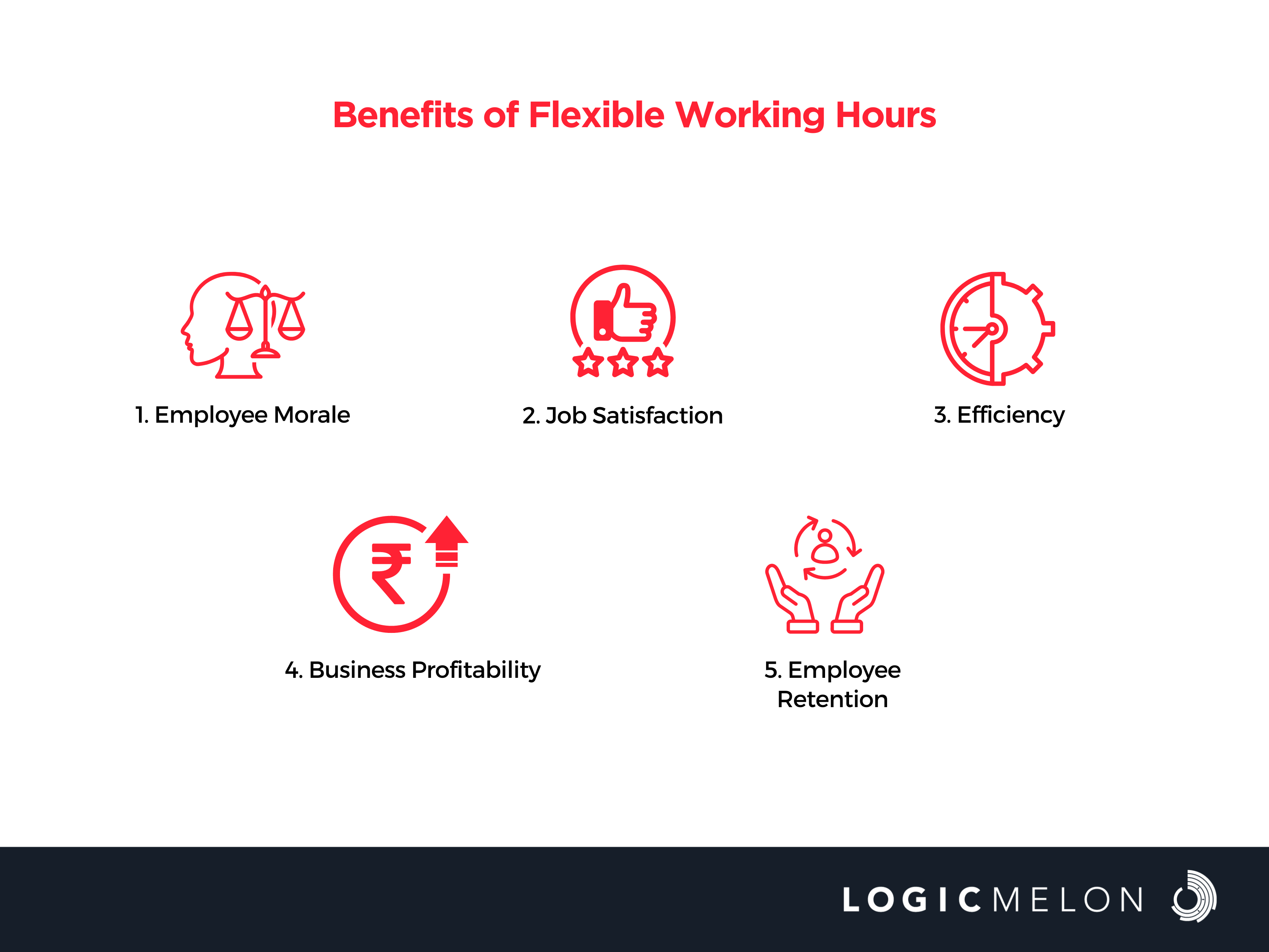Benefits of Flexible Working Hours
Flexible working hours aren’t just a deviation from the traditional work schedule; they’re a revolution. Imagine a work setup where rigid schedules take a back seat, and employees have the power to craft their work hours in ways that align with their personal needs and preferences. This newfound autonomy creates an environment that’s not just accommodating but empowering.
How Does a Flexible Work Schedule Work?
Gone are the days when flexible work hours were reserved for freelancers and gig workers. Today, even traditional employers are jumping on the bandwagon, offering flexible schedules that are a win-win for both employees and businesses. Flexible working hours have transcended the realm of an alternative work arrangement to become a sought-after approach that benefits all.
Company policies provide flexibility, and the employee has the option of a flexible schedule. The primary objective of flexible working hours is to give employees more control over their working hours to accommodate their personal needs and preferences.
61% of employees are burned out on the job. It allows employees to customise their work schedule according to the parameters set by the employer.
The agreement usually consists of
- Where do the employees work?
- Creating a work schedule that is best for them
- Scheduling the work day however they want
Types of Flexible Working Hours
- Condensed Schedule: A condensed schedule is when the employees increase the hours they work per day so that they have to work longer for three or four days, giving them additional days off during the week, which vary according to the terms.
- Flextime: Employees with flextime can choose their own start and end times.
- Hybrid Schedule: A hybrid work schedule will allow you to work remotely and combine it with in-person time in an office.
- Job Sharing: Job sharing is an employment arrangement where two people work together for a job. The split of workloads can be unequal or equal, according to the terms of both employees. The employer enables two employees to perform the duties of one full-time job.
- Location Flexibility: Location flexibility gives the employees the ability to work elsewhere rather than at the primary site. The most common type of location flexibility is telecommuting, but the employees can work outside the branch office.
- Part-time Jobs: Working part-time enables employees to work fewer hours in order to have schedules that fit their other commitments.
- Reduced Schedule: A reduced schedule makes the employees work shorter hours than the company’s standard workweek.
Benefits
Expecting an employee to reach their peak performance during traditional working hours is ambitious. When employees are bound to work in a fixed work environment, their deadlines may take a hit since they are busy winding up time rather than being productive. In this blog, learn why it would be helpful for your employees to work on a non-traditional schedule.

1. Employee Morale
Employee morale tends to increase because it enables them to work whenever they feel like it and to get the job done. The comfortable time certainly changes from person to person. For some people, working at night makes them productive. For the employee to perform well at their job, it is crucial to keep them happy and engaged.
2. Job Satisfaction
Flexible working hours improve work-life balance and reduce stress for employees. The employees feel trusted and are more likely to deliver effective service to employers. With this, the employees can avoid rush-hour traffic and long commutes, resulting in shorter commutes and better work efficiency.
3. Efficiency
One of the reasons why an employer allows remote work is because they think that they cannot monitor their employees, so the employees will not work. But working flexibly can increase the productivity of an employee. When you are in a flexible work environment, it contributes to more work-life integration, enhanced job satisfaction, and overall personal well-being.
4. Business Profitability
Flexible work timing also increases productivity and employee engagement. When employees have flexible working hours, they are more likely to be more focused and efficient. This will lead to more work being done and improve the business’s profitability.
5. Employee Retention
Allowing the existing employees to work flexibly helps retain valuable employees. Flexible working hours help them better balance their personal and work-life responsibilities.
Employee retention positively influences flexible working hours by tailoring their work hours to fit their individual preferences and peak productivity times.
Frequently Asked Questions
1. Are there any core hours that employees must work?
The flexible arrangement requires employees to be present during the specific core hours when communication and collaboration with the employees are necessary. These core hours help to ensure effective team coordination.
2. How do organisations ensure a smooth transition to flexible working hours?
To ensure a successful transition, organisations must communicate effectively with employees about their job responsibilities, agreed-upon hours based on business needs, and any other factor that should be addressed in advance.
3. Are there any downsides to flexible working hours?
Flexible working hours may lead to employee isolation, which causes burnout and overworking as the employee may feel reluctant to work outside their working hours.
Embrace the Change
Flexible working hours celebrate the dynamic nature of work. It’s about when and where you work. These hours ebb and flow, creating a vibrant tapestry of possibilities. As businesses create guidelines and set expectations, they ensure that employee needs and business objectives intertwine harmoniously.
In the grand symphony of work, flexible hours compose a melodious tune that resonates with wellbeing, productivity, and loyalty. As the world dances to the rhythm of change, flexible working hours stand as a testament to a future where adaptability is the key and where the traditional notion of work finds a refreshing twist. So, are you ready to embrace the revolution of flexibility? The time is now.
LogicMelon
Award-winning recruitment software that will find, attract, hire and analyse the way you want to work. At LogicMelon, we have experienced software recruitment marketing specialists to help you build effective recruitment solutions supported by the best customer service you’ll find anywhere!
Email: [email protected] or call LogicMelon (UK) +44 (0) 203 553 3667 (USA) +1 860 269 3089
Human Resource Outsourcing: Definition, Benefits, Tips
In this blog, we will delve into the world of human resource outsourcing, exploring its definition, the benefits it offers, and the common functions that companies outsource.
What to Look for Before Joining an Organisation
Are you about to embark on a new professional journey? It’s crucial to assess whether the organisation is the right fit for you.
Recruiting vs Talent Acquisition: Differences
When it comes to the world of HR, recruiting and talent acquisition are often viewed as interchangeable terms. However, a closer look reveals a myriad of differences between the two


